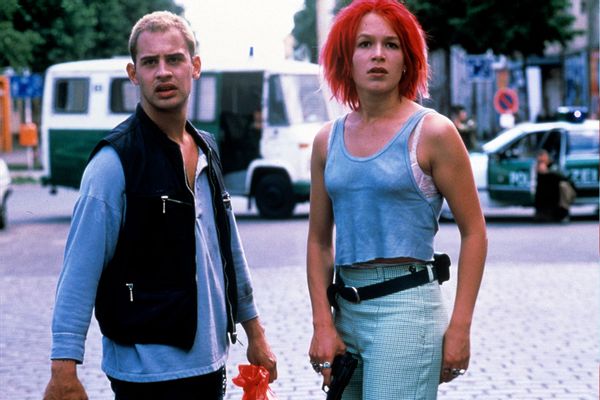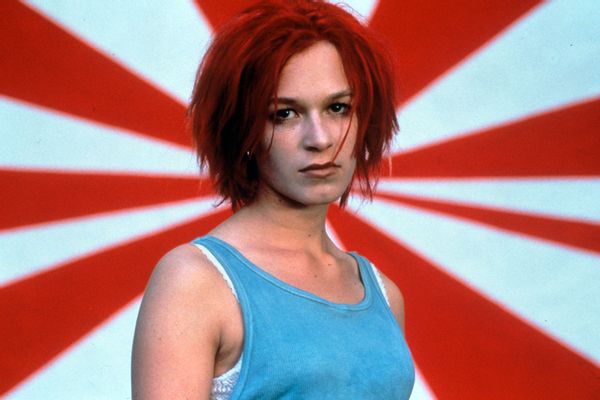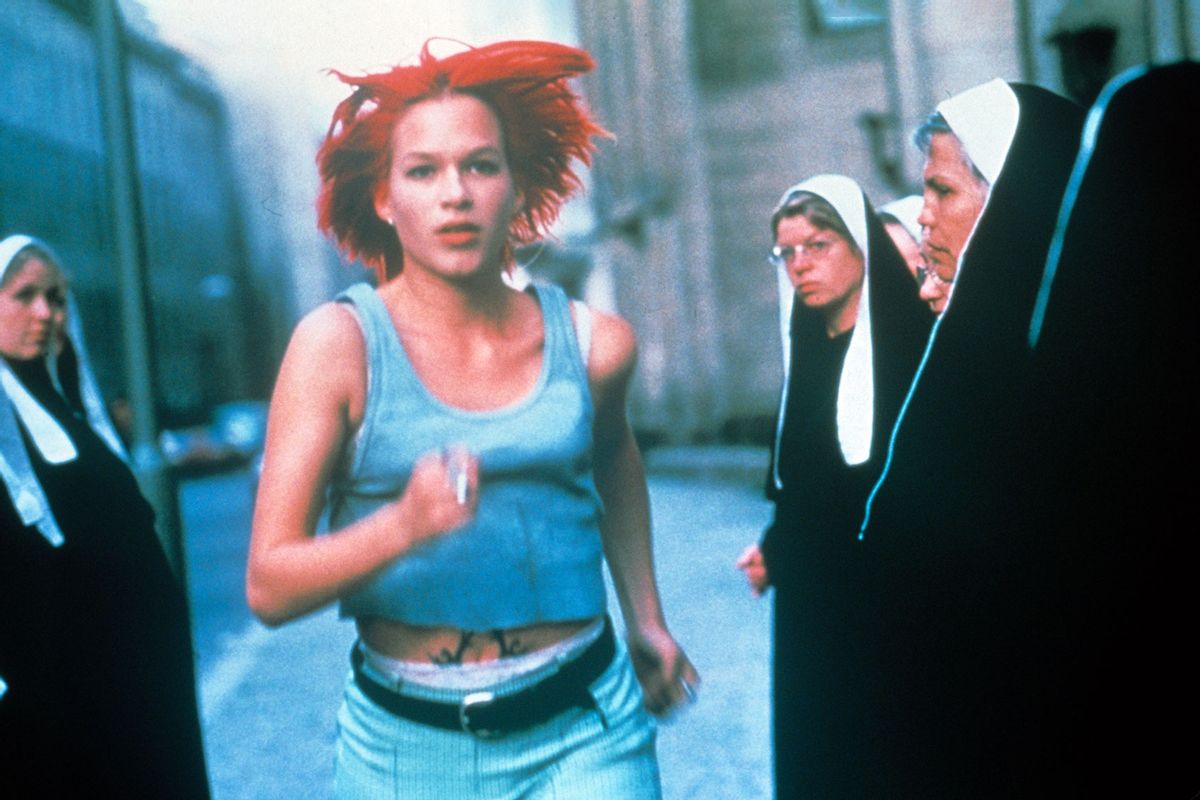Franka Potente had a breakout role as the title character in “Run Lola Run” back in 1999 when this energetic film first screened in American theaters. Now, for its 25th anniversary, the cult classic written and directed by Tom Tykwer is being re-released in theaters in a stunning 4K restoration edition.
"When you come out of a run and run into a raw and emotional situation it is different than if you walk up to it."
The simple story holds up despite the fact that cell phones and Ubers were not around at the time it was made. Lola (Potente) gets a call from her boyfriend Manni (Moritz Bleibtrau) saying he lost 100,000 Deutsche Marks he owes a gangster because Lola did not meet him in time. Now he implores her to get the money and meet him — in 20 minutes! — or Manni will be killed. “Run Lola Run” shows three different versions of how things might play out as Lola races to find the cash and meet Manni before it is too late.
Watching Potente with her fiery red hair and Doc Martens rush through the streets of Berlin to a fabulous techno soundtrack remains as intense and as exciting as it was back in the day. It is easy to root for Lola because she is so determined; just watch her facial expressions as she tears through the streets of Berlin. Potente’s performance, however, involves more than just her fleet feet. Lola has a scream that can break glass, and she has a strained relationship with her father, which gets more complicated in each iteration of the story. In addition, Lola asks big questions, especially when she wonders if Manni truly loves her.
After the film became a hit, Potente worked with Tykwer (her off-screen partner at the time) on “The Princess and the Warrior” in 2000. She soon took roles in Hollywood films like “Blow” and “The Bourne Identity” and its sequel, as well as in films by idiosyncratic directors like Todd Solondz (“Storytelling”) and Peter Greenaway (The Tulse Luper Suitcases). In addition, Potente worked in various TV series, including “Copper,” “The Bridge” and most notably, “Claws” before directing her first feature, “Home” in 2020.
Potente spoke with Salon about the enduring legacy of “Lola.”
Are you generally someone who is on time, or did Tom Tykwer create this film to show you why you shouldn’t be late for things?
[Laughs.] I don’t know if that’s what the film says. I think the film says, “If you’re late, your life could be totally different” — which we might embrace. Why not?! I’m early most of the time. I have kids. I’m pretty organized. If I wasn’t, I wouldn’t have any time to myself. I will not ring the doorbell early at your house, but I am on time. And as Germans, if someone is 5 minutes late, we notice. Terrible! Tom was always late. We would go see late-night movies and he would come from the editing room, and I can’t tell you how many times I’ve seen a film sitting in the first row. In Germany, we call it the “Academic 15.” Do you have that? If you are 15 minutes late, it’s OK — but no, it’s not.
 Moritz Bleibtrau and Franka Potente in "Run Lola Run" (Sony Pictures Classics)
Moritz Bleibtrau and Franka Potente in "Run Lola Run" (Sony Pictures Classics)
Why do we root for Lola? She is helping Manni, but she does at one point question his love for her. How do you see her character, and what did you think of her having to save her man from death?
There’s no time to think, “Should I do this?” It’s very immediate; the enticing thing is the immediacy of the decision. She would do that for a lot of people. Her mom is f***ed up, but she’d do the same for her. The film claims this is an initial human response. Humans want to impulsively help. I’m not sure that’s true for everybody all these years later. But this initial jolt of — of course! — before you think about it. There’s no stopping. It is as if, on an abstract level, a thought goes out there, and you follow it without questioning. There’s something to be said about that. We tend to overthink or put all these stops in our actions instead of committing to something and following it through. Enjoy that energy of commitment or impulse. Do we trust our impulses? I’m a very impulsive person. We don’t know that much about her, and she is young . . .
Lola has a “bad day” in the first episode, and not such a great one in the second. Can you talk about calibrating Lola’s emotions in each sequence? We feel for her each time, but she’s different in each episode, impulsive, thoughtful, reckless.
I have to hand that over to Tom. I wasn’t so involved as an actor. When you look back as a seasoned actor — a terrible word — what happens when you have been acting over 26 years is you have honed your craft. But over time you lose the freshness, the rawness that comes with a certain naivete. I definitely had that for Lola. You’re more malleable. With the right director, it is magical. The simple act of running all the time and the breathlessness of that, and that, paired with my youth, made me open to surrendering to the process. Tom really guided me. He gave me mantras or parts of poetry, or he would just whisper something in my ear to guide me. We didn’t have structural conversations. He would just give me stuff to think about. With the running, I was so breathless. When you come out of a run and run into a raw and emotional situation it is different than if you walk up to it. You are sweaty and out of breath you are wide open. He knew that; I didn’t. I was 22. He knew to take the energy and harness it and calibrate me. I followed his lead I had a feeling of excitement. I felt safe and guided and connected.
What input, if any, did you have in creating Lola’s look? Her red hair, her Doc Martens? She’s become iconic. Were you involved in that process at all? How did you become her?
I think they made me believe I was involved. [Laughs] If someone came to me now and said we’re going to bleach your hair eight times — eight times! because my hair was really dark — and it’s going to be bright red, I would say, “No, you’re not!” But I was young, and I dyed my hair every two weeks anyway. Yeah! Free hair color! The way Tom conducted himself, he was an actor-whisperer. You believe that he has your best interest in mind, and he makes you part of it. I was like, “Yeah, let’s do it!” They gave me a thong, and I was like, “I’m not wearing that” and they said, “Yes. You are!” The look was something we created together. I'm a team player, and I have opinions, but making movies, I appreciate what the other people do. I don’t want the costume designer to tell me how to act. I like to lean on everyone’s talent, but I provide an opinion if asked.
How much running did you do in the film? Meaning how many takes of filming “Run Lola Run” were required given the film’s repetitive structure?
I’m way more of a runner now than I was then. I ran [during] rehearsals. In the beginning, I was told I could keep my sneakers on for rehearsals, but then I was told there was no time so I had to keep the frigging Doc Martens on. I ran during rehearsal, during all the takes and then I had to run for sound! I ran everything. I was young, but I was smoking two packs a day. When you are in your 20s, you do all that and you’re OK, and you sleep four hours and you do it again.
You sing on the film’s soundtrack, and Lola’s scream breaks glass. Can you talk about sound and your vocal performance in the film?
That’s Tom’s style also. He loves for his main characters to become the film on every level. With the singing, part of it was because they didn’t have anyone to sing the layout, and I was dating him, at the time, so I would go to the post-production studio and hang out, and they were like, “Can you sing this?” I was like “Yes, of course!” We got an MTV award, a Platinum record, and I got nothing. They didn’t have any money to pay anyone to sing it for real. I had to do a duet with a German rapper, we had to shoot an embarrassing music video, and they wanted us to perform after the film blew up. I could have had a second career as singer! It could have some fun renaissance. I went to a rave in downtown L.A. recently, and it was so Berlin 1994. Very retro!
The film is very retro. If we had cell phones and Ubers back then, the film would be a short!
There is something about self-reliance. [Today] when the Uber doesn’t come, you might talk to neighbor. We still have moments where we don’t have wiggle room. F**k this s**t, I gotta do it myself. Even at the time when Lola runs, there are trains and trams that she could have taken, but that’s not so much fun.
 Franka Potente in "Run Lola Run" (Sony Pictures Classics)
Franka Potente in "Run Lola Run" (Sony Pictures Classics)
What do you recall about the responses you received regarding the film? Anything particularly strange or memorable.
It was really a journey. At first it was in Europe, then it kept happening. New Directors/New Films [festival] in New York and then Sundance. Is this going to stop anytime soon? It was crazy. I remember meeting Natalie Portman, and she told me she went as Run Lola Run for Halloween. You did? Cool. I remember we met Gregory Peck’s widow, and she told us he loved “Run Lola Run.” Dustin Hoffman called us in the middle of the night while we were shooting “The Princess and Warrior” because he wanted to work with Tom {Tykwer] and wanted to meet us. We hung out with him, and I was driving Hoffman around in my Saab with cigarette butts in it. Those tidbits I remember because they were bizarre at the time, but they are good memories.
Did you leverage the success of “Lola” to your career — working in Hollywood and TV, and even getting an opportunity to direct?
"When Lola runs, there are trains and trams that she could have taken, but that’s not so much fun."
At the time, they were plugging me and Penélope Cruz because we came up at the same time. They tried to plug actors that were hot and brought energy. There were a lot of parts I didn’t get because I was too specific — I had a strong accent, and the way I looked in my 20s — you had to be blonde then. I wasn’t working out. I was smoking cigarettes and doing other things. I wasn’t fitting into the categories. After “Bourne” I shaved my head – just 'cause, I don’t know why. I had a meeting with John Woo. It was a big deal at the time, and my agent almost threw up when she saw me. She said, "You have to get a wig." And the coolest wig I could find was a Morticia Adams wig, jet black. And I was hungover, and I was sweating because of this wig. I was young! The agent called me with feedback and said he thought there was something strange about my hair. I was like a little punk ass kid from Berlin, and I acted like one and that wasn’t always appreciated. It may have cost me a job here and there. I was being authentic!
But you worked with Peter Greenaway and other arthouse directors.
That came out of Tom. He was my guide. In the five years we were together, I’d watch the films he watched, and I learned how to talk about it and art and how you can actually see it. I was seeking out the stuff we grew up with in Berlin. We’d go see arthouse films and were friends with Wim Wenders. You could say, “I want to work with Greenaway and Todd Solondz and they would make it happen!
The film asks a question about fate, “What if you never met me?” What do you think your career might have been like if you had not made “Run Lola Run”?
Maybe I would have had a career in Germany. I was a working actor at the time I made “Lola.” I came from a small town. There was not even a movie theater. It was unlikely I would even become an actor. Before “Run Lola Run,” I had already hit the ceiling of what my dreams could have been. I didn’t think about making movies. I thought maybe I could be a theater actress, and that would have been super dope in my world. It’s different in hindsight. I think I would have been totally fine. I might not live in America, but I was an exchange student in Texas at 16. That kind of calibrated me. I was obsessed with speaking English. I understood that meant freedom. I could make friends and experience countries that other people who didn’t speak the language couldn’t. I wanted to be a stewardess at the time because I had a boyfriend in Texas. I was being practical. That would have been cool. I could have been a Lufthansa girl, flying to Texas. This is one path I ended up on. Great! But I could imagine other paths that I was open to or was thinking about that would have made me super happy also.
Want a daily wrap-up of all the news and commentary Salon has to offer? Subscribe to our morning newsletter, Crash Course.
What about directing and doing television? You’ve diversified your career since “Lola.” What are your aspirations now, having been in the industry for almost three decades?
I love directing. I have so many scripts I wrote over the pandemic. Unfortunately, with COVID and the strike, the landscape is reconfiguring. It is not a great landscape for independent film right now. It is very difficult. If I could pick and choose, I would love to live off being a director. It was the best time of my life. I love acting, too. After a year of the strike, that’s what I’m doing right now. We will see in the near future how everything is recalibrating. It is interesting times, to say the least.
Are you an optimist or a realist?
I think I’m both. I always look forward. I am not a nostalgic person. I am not sentimental, but here we are talking about a movie from 25 years ago! I appreciate that.
“Run Lola Run” is being re-released in theaters nationwide June 7.
Read more
interviews by Gary Kramer
- "What you imagine is much more terrible": How Viggo Mortensen made a classic Western feel different
- Orlando Bloom faces his daredevil fears and asks, "What is the thing you consider to be your edge?"
- "We are in times that require us to listen": Tessa Thompson's lessons from playing a helpline worker



Shares